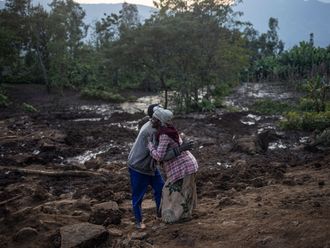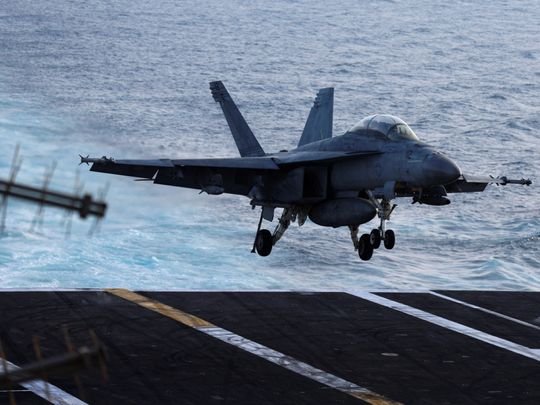
DUBAI: The European Union launched a naval mission on Monday to protect Red Sea shipping from Yemen’s Al Houthi militants as a US-owned cargo vessel repeatedly came under fire in the region.
The Iran-backed Houthis, who control much of war-torn Yemen, have been harassing the vital shipping lane since November in a campaign they say is in solidarity with Palestinians in Gaza during the Israel-Hamas war.
The EU aims to have the mission — called Aspides, Greek for shield — up and running in a “few weeks” with at least four vessels, an official said on Friday, ahead of Monday’s official launch.
“Europe will ensure freedom of navigation in the Red Sea, working alongside our international partners,” European Commission President Ursula von der Leyen wrote on X, formerly Twitter.
The United States is already spearheading its own naval coalition in the area and has conducted retaliatory strikes on the Houthis in Yemen along with Britain.
The dozens of Houthi attacks have roiled shipping in the Red Sea, forcing some companies to take alternative routes including a two-week detour around the tip of southern Africa.
In the latest incident, a Greek-flagged, US-owned cargo ship was attacked twice in two hours in the Gulf of Aden, which adjoins the Red Sea, maritime security firm Ambrey said.
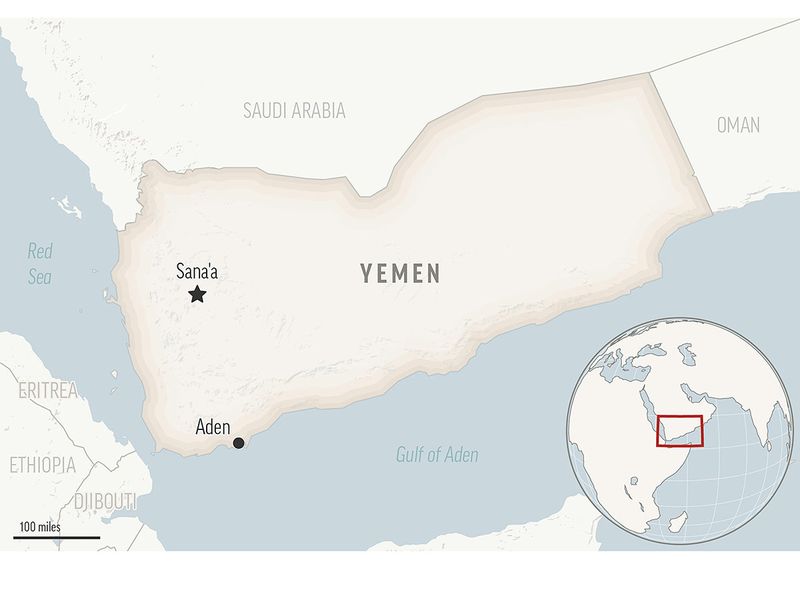
In fact, 40% of Asia-Europe trade normally goes through the area, including a huge amount of oil and diesel fuel for import-dependent Europe. So do food products like palm oil and grain and anything else brought over on container ships, which is most of the world’s manufactured products.
In all, about 30% of global container traffic and more than 1 million barrels of crude oil per day typically head through the Suez Canal, according to global freight booking platform Freightos Group.
HOW ARE HOUTHI ATTACKS AFFECTING TRADE?
Huge shipping container companies, including Maersk, are avoiding the Red Sea and sending their ships around Africa and the Cape of Good Hope. That adds a week to two weeks to voyages and increases costs for for shipping, fuel and more.
At least 90% of the container ships that had been going through the Suez Canal are now rerouting around the tip of Africa, said Simon Heaney, senior manager of container research for Drewry, a maritime research consultancy.
The cost to ship a standard 40-foot container from China to northern Europe has jumped from $1,500 to $4,000, according to the Kiel Institute for the World Economy in Germany. But that is still far from the $14,000 seen during the pandemic.
The delays contributed to a 1.3% decline in world trade in December, reflecting goods stuck on ships rather than being offloaded in port.
WHAT DOES IT MEAN FOR OIL PRICES?
Crude prices rose about 4% following the US-led airstrikes. International benchmark Brent traded at just over $80 per barrel Friday, still down from about $84 on the eve of the October 7 Hamas attack on Israel.
“While this puts upwards pressure on global oil prices, it is unlikely to represent a serious energy supply shock for now,” Simone Tagliapietra, an energy analyst at the Bruegel think tank in Brussels, tweeted.
That could change if the Hamas-Israel and Al Houthi conflicts escalate and lead to trouble at the Strait of Hormuz at the southern end of the Arabian Gulf, he said.
“That would have massive implications for global energy markets,” Tagliapietra said.
HOW IS THE WORLD RESPONDING?
The US is leading a security initiative to protect ships in the Red Sea that includes United Kingdom, Bahrain, Canada, France, Italy, Netherlands, Norway, Seychelles and Spain. Al Houthis have no navy to impose a cordon, relying on harassing fire and only one helicopter-borne assault so far.
Friday’s strikes killed at least five Al Houthi troops and wounded six, the rebels said, without elaborating on what was targeted. It was unclear how extensive the damage from the US strikes were, though the Houthis said at least five sites, including airfields, had been attacked. -- Reuters
The Greek-flagged bulk carrier reported a “missile attack” before another projectile hit the water just metres from the ship, Ambrey said.
No injuries or damage were reported in either incident and the ship was continuing its journey to Aden, the report said.
Earlier, the Huthis claimed an attack on a British ship in the Gulf of Aden that was earlier reported by Ambrey.
The ship is “now at risk of potential sinking in the Gulf of Aden”, the Houthis’ military spokesman Yahya Saree said in a statement. The claim could not be independently verified.
‘Impact on the entire world’
As the attacks continued, Qatar’s energy minister called for a ceasefire in Gaza to end the insecurity in the Red Sea, which has disrupted hydrocarbon deliveries along with other trade.
Saad Al Kaabi, who is also the chief executive of state-owned QatarEnergy, said the “root of the problem” in the Red Sea, where Iran-backed Houthi rebels have targeted commercial vessels, “is the Israeli invasion of Gaza”.
“Hopefully there is a ceasefire soon that will stop that so that the economic impact on the entire world stops,” he said at a ground-breaking ceremony for a new petrochemicals plant on Qatar’s northeast coast.
Italian top diplomat Antonio Tajani confirmed the EU mission’s launch during a meeting of foreign ministers in Brussels, calling it “an important step towards common European defence”.
The overall commander of the EU mission will be Greek, while the lead officer in operational control at sea will be Italian.
So far France, Germany, Italy and Belgium have said they plan to contribute ships.
The EU says the mission’s mandate — set initially for one year — is limited to protecting civilian shipping in the Red Sea and that no attacks will be carried out “on Yemeni soil”.
An EU official said there would be “continuous military to military contact” to coordinate actions with the US and other forces in the region.
The EU’s 27 countries agreed the Red Sea mission in a matter of weeks as concerns mount that the Huthi attacks could damage their economies and push up inflation.



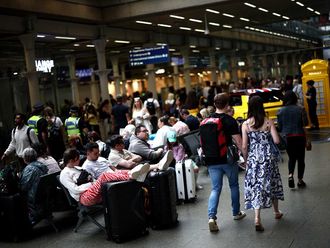




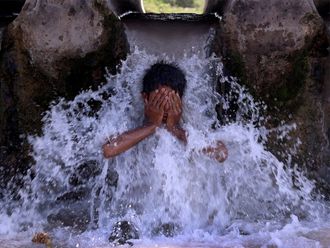

_resources1_16a30b3523c_small.jpg)
